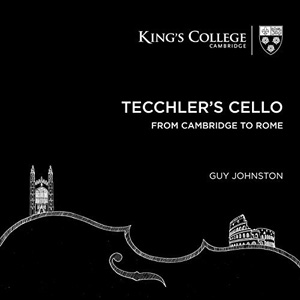British cellist Guy Johnston wanted to celebrate the 300th “birthday” of his David Tecchler cello in a manner suited to its distinguished provenance (Tecchler’s renowned 18th-century Roman workshop), distinctive character, and love-at-first-sight compatibility with its owner (Johnston tells the story of his acquisition of the instrument in the booklet notes). First, he commissioned three new pieces; then, he decided to take the cello on a “journey, following my own musical roots”, which would conclude at the cello’s Roman birthplace.
This plan resulted in a program featuring an odd assortment of venues (mostly around England) and an equally unusual collection of musical works, ranging from the 18th to 21st centuries, recorded during 2016 and 2017. Included are pieces for solo cello (David Matthews’ Ein Celloleben; Mark Simpson’s Un Regalo), two solo cellos (Jean-Baptiste Barrière’s Sonata in G major), cello and piano (Charlotte Bray’s Perseus), Beethoven’s Piano Trio Op. 70 No. 1, and a work with orchestra, Respighi’s Adagio con variazioni, the one piece on the program recorded in Rome. The opening piece, by Ola Gjeilo, is actually a choral work that includes a cello. The connection here is that Johnston began his musical career as a chorister at the famed King’s College, Cambridge; the cellist recently performed Gjeilo’s Serenity (O Magnum Mysterium) as part of a Carols from King’s BBC broadcast. It’s a breathtaking, show-stopping work, sublimely beautiful–and so is the recording, one of the more pleasing I’ve heard from a space that often renders voices too bright and textures obscure.
Each of the newly commissioned pieces shows an affinity for the cello–a good thing, of course–but also a perspective related to this particular instrument and occasion: corny title aside, Matthews’ piece makes a strong impression, pointedly covering the cello’s entire range, touching on themes from earlier works (Corelli, Beethoven, Ravel) on its “journey” through three centuries; Bray’s Perseus gets caught up in ideas such as “black holes” and other “cosmic atmospheres”, and gimmicks like creating a “musical language” using (most of) the letters from the name David Tecchler, all of which you can ignore and just enjoy the interaction between the two instruments–percussive, spooky, intense, vibrant; in Un Regalo (A Gift) composer Simpson really tries to explore the sound and character of this Tecchler instrument, and it’s all about sound and effects and virtuosity.
The rest of the program offers solid, finely rendered performances of more traditional 18th and 19th century works–an energetic, finely polished Beethoven trio (with violinist Magnus Johnston and pianist Tom Poster), Barrière’s curiously captivating two-cello sonata (with second cellist Sheku Kanneh-Mason), and Respighi’s Brahmsian Adagio con variazioni (with able accompaniment by Carlo Rizzari and Rome’s Santa Cecilia orchestra). When you accept that this recording is more about the cellist and his cello than it is about well-conceived programming, you’ll be prepared to really enjoy this somewhat strange (but superbly-performed and recorded) “journey”. And it’s worth it just for that opening piece, Gjeilo’s Serenity.
































